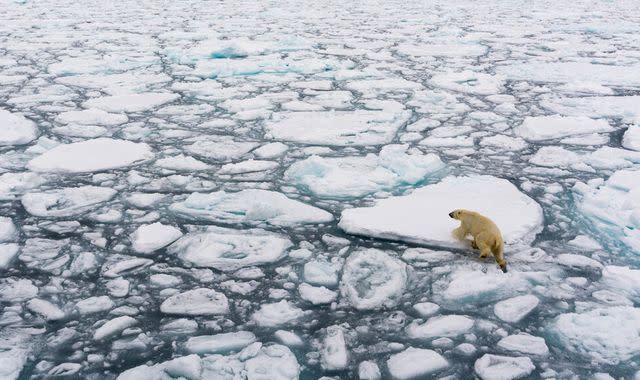Melting Arctic ice caps helps predict UK heatwaves, study finds - as scientist reveals this summer's forecast

When the UK sizzles during an intense summer heatwave it could well be linked to melting ice caps and glaciers in the frozen North, according to a new analysis.
While increased melting due to climate change could make such events even more extreme, the connection may also make heatwaves possible to predict up to a year in advance, the study finds.
"We will be able to estimate the exact year of the warm and dry summer in northern Europe more closely in the winter before it occurs," says Dr Marliena Oltmanns at the National Oceanography Centre in Southampton who led the research.
Such a forecasting ability could be significant, allowing farmers, hospitals, or power providers time to plan for heatwaves that are already becoming more extreme due to increasing global average temperatures.
Researchers have suspected for a while that there is a link between weather extremes in northern Europe and the intense summer melting in the Arctic and subarctic due to climate change - but how they might be connected remained elusive.
The new study looks at the influence of billions of tonnes of cold, fresh meltwater from ice caps and glaciers on the North Atlantic current and the position of the jet stream high in the atmosphere.
In summer, melting can lead to major differences in where warm tropical water carried by the North Atlantic current meets cold water. This in turn impacts weather systems that can induce a "kink" in the jet stream above.
The powerful jet stream is a major influence on how weather systems move over Europe. When it's "kinked" the result is usually high pressure and hot air from southern Europe and Africa sitting over the UK.
This was exactly the situation that preceded heatwaves in the UK in 2018 and in 2022 when temperatures breached 40C in the UK for the first time on record - an event believed to have caused nearly 3,000 excess deaths.
The research also casts doubt on the significance of recent headlines warning of a "shutdown" of a slower North Atlantic ocean current called the Atlantic Meridional Overturning Oscillation - often misnamed the Gulf Stream.
Reports suggested the slowing of this current could plunge places like the UK into continual cold, Arctic-like weather.
But the short-term influence of ocean temperatures on the jet stream - which plays a far bigger role in dictating weather patterns - is likely to overwhelm any impact this slow-moving ocean current has on weather, argues Dr Oltmanns.
"Where does the wind come from - that's what has the greatest impact on society," she says.
Read more:
'Real danger' UK will miss out on economic growth without green plan
Oil and gas vote is a political boost for PM - but won't help our energy needs
What does the current situation in the North Atlantic say about this coming summer?
An extreme ocean heatwave in 2023 makes it less likely we'll expect a "kinked" jet stream and therefore an extreme heatwave says Dr Oltmanns.
So don't rush out and buy a new barbeque just yet...
But perhaps consider where you want to go on holiday.
The current situation does increase the likelihood that southern Europe will endure another summer of intense heat like we saw in 2023 - a heatwave that led to widespread wildfires and drought.

 Yahoo News
Yahoo News 
